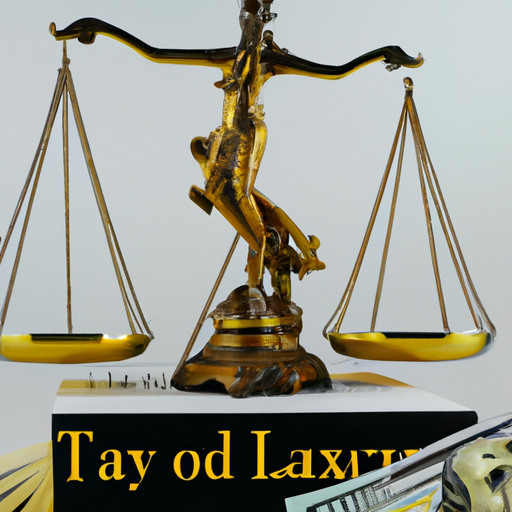Are you a business owner or a high net worth individual in Santaquin, Utah? If so, you may find yourself in need of a tax lawyer who specializes in helping individuals and businesses navigate the complex world of taxes. Look no further than our experienced tax lawyer in Santaquin, Utah. With a deep understanding of the unique needs and concerns of wealthy individuals and businesses, our lawyer is here to provide expert advice and guidance. Through informative blog posts, engaging case studies, and real-life scenarios, we aim to showcase our expertise and set our lawyer apart from the competition. So why wait? Call our tax lawyer today for a consultation and take the first step towards reducing your tax burden and finding peace of mind. Let us help you navigate the intricate world of taxes with confidence.

Why Hire a Tax Lawyer in Santaquin, Utah
Understanding the Importance of Hiring a Tax Lawyer
When it comes to dealing with tax-related matters, having a knowledgeable and experienced tax lawyer by your side can make all the difference. Tax laws can be complex and constantly changing, and without proper guidance, you may find yourself facing unnecessary financial and legal difficulties. Hiring a tax lawyer in Santaquin, Utah can provide you with the expertise and support you need to navigate the intricacies of the tax system effectively.
Benefits of Hiring a Tax Lawyer in Santaquin, Utah
One of the key advantages of hiring a tax lawyer is their in-depth understanding of tax laws and regulations. A tax lawyer can analyze your unique situation and provide personalized advice and strategies to help you achieve your financial goals while remaining compliant with the law. They can help you maximize tax savings, minimize liabilities, and ensure you are taking advantage of all available deductions and credits.
Additionally, a tax lawyer can act as a strong advocate on your behalf in various tax-related matters. They can represent you during IRS audits, negotiations with tax authorities, and in tax litigation if necessary. Their expertise can help protect your rights and ensure a fair resolution to any disputes or issues that may arise.
Examples of Tax Issues a Lawyer Can Help With
Tax lawyers in Santaquin, Utah are well-equipped to handle a wide range of tax issues and challenges. Here are a few examples of the areas in which a tax lawyer can provide valuable assistance:
-
Tax planning and strategy: A tax lawyer can help you develop a comprehensive tax plan tailored to your specific needs and goals. They can advise you on the most effective strategies to minimize your tax liability and maximize your savings.
-
Tax disputes and litigation: If you find yourself in a tax dispute with the IRS or another tax authority, a tax lawyer can represent you throughout the process. They can handle all aspects of legal proceedings, from negotiations to courtroom representation.
-
Tax debt relief and negotiation: If you are struggling with tax debt, a tax lawyer can help you explore options for relief and negotiate with tax authorities to find a manageable solution. They can assist with offers in compromise, installment agreements, and other debt relief programs.
How to Choose the Right Tax Lawyer in Santaquin, Utah
Consider the Lawyer’s Expertise and Experience
When searching for a tax lawyer in Santaquin, Utah, it’s essential to consider their expertise and experience in tax law. Look for a lawyer who specializes in tax law and has a deep understanding of the local tax regulations and compliance requirements. A lawyer with extensive experience in handling similar cases can provide valuable insights and solutions to your tax issues.
Evaluate the Lawyer’s Track Record
Before hiring a tax lawyer, take the time to evaluate their track record of success. Look for testimonials or case studies that highlight their past achievements and client satisfaction. A lawyer with a proven track record of delivering positive outcomes can instill confidence and reassurance in their ability to handle your tax matters effectively.
Assess the Lawyer’s Communication and Availability
Effective communication is crucial when working with a tax lawyer. During your initial consultation or interaction, assess the lawyer’s communication style and responsiveness. You should feel comfortable discussing your concerns and asking questions. A tax lawyer who is accessible and responsive can provide you with the support and guidance you need throughout the process.
Tax Laws in Santaquin, Utah
Overview of Tax Laws in Santaquin
Santaquin, Utah, follows the tax laws and regulations set forth by the state of Utah and the Internal Revenue Service (IRS). These laws govern various aspects of taxation, including income tax, sales tax, property tax, and employment tax. It’s important to have a solid understanding of these laws to ensure compliance and avoid penalties or legal issues.
Specific Tax Laws Applicable to Businesses in Santaquin
Businesses in Santaquin are subject to specific tax laws that dictate their tax obligations and responsibilities. These may include corporate income tax, employer withholding tax, excise tax, and sales tax. A tax lawyer can help businesses navigate these complex tax regulations and ensure compliance to avoid any potential legal consequences.
Specific Tax Laws Applicable to High Net Worth Individuals in Santaquin
High net worth individuals in Santaquin may face unique tax challenges and opportunities. There may be additional tax laws and regulations that apply to their income, investments, and estate planning. A tax lawyer who specializes in working with high net worth individuals can provide valuable guidance to maximize tax savings, protect assets, and ensure legal compliance.
Services Offered by a Tax Lawyer in Santaquin, Utah
Tax Planning and Strategy
One of the key services offered by a tax lawyer is tax planning and strategy. They can help individuals and businesses develop personalized tax plans to optimize their financial situation. By considering various tax-saving strategies and taking advantage of available deductions and credits, a tax lawyer can help clients minimize their tax liabilities and achieve greater financial efficiency.
Tax Disputes and Litigation
In the event of a tax dispute or legal issue, a tax lawyer can provide representation and support throughout the litigation process. Whether it’s an audit, an investigation, or a legal dispute with a tax authority, a tax lawyer can advocate for their client’s best interests and navigate the complexities of the legal system on their behalf.
Tax Debt Relief and Negotiation
Dealing with tax debt can be overwhelming and stressful. A tax lawyer can help clients explore options for tax debt relief and negotiate with tax authorities to find a favorable resolution. They can assist with offers in compromise, installment agreements, and other debt relief programs to help clients regain control of their finances and alleviate the burden of tax debt.
How a Tax Lawyer Can Help Businesses in Santaquin, Utah
Navigating Complex Tax Regulations and Compliance
Businesses in Santaquin face numerous tax regulations and compliance requirements. A tax lawyer with expertise in business tax law can provide guidance on navigating these complexities. They can help businesses understand their tax obligations, develop effective tax strategies, and ensure compliance with all relevant laws and regulations.
Representing Businesses in Tax Audits and Investigations
If a business in Santaquin is selected for a tax audit or investigation, a tax lawyer can provide crucial representation. They can handle all communications with the tax authorities, gather necessary documents and evidence, and ensure that the audit or investigation proceeds fairly and according to the law. With a tax lawyer by their side, businesses can navigate the audit process with confidence.
Assisting with Mergers and Acquisitions and their Tax Implications
When businesses in Santaquin engage in mergers or acquisitions, there are significant tax implications to consider. A tax lawyer can provide valuable guidance throughout the process, helping businesses understand the potential tax consequences and develop strategies to optimize the transaction. They can also assist with due diligence, tax planning, and compliance to ensure a smooth and successful transition.
How a Tax Lawyer Can Help High Net Worth Individuals in Santaquin, Utah
Maximizing Tax Savings and Minimizing Liabilities
High net worth individuals in Santaquin often have complex financial situations that require specialized tax planning. A tax lawyer with experience in working with high net worth clients can help maximize tax savings and minimize tax liabilities. By considering various strategies such as charitable giving, trusts, and estate planning, a tax lawyer can help ensure that high net worth individuals achieve tax efficiency while remaining compliant with the law.
Asset Protection and Estate Planning for Tax Efficiency
Another area where a tax lawyer can provide valuable assistance to high net worth individuals is asset protection and estate planning. By integrating tax-efficient strategies into estate plans, individuals can protect and preserve their wealth for future generations while minimizing tax liabilities. A tax lawyer can help craft personalized estate plans that address the unique needs and goals of high net worth individuals.
Guidance on International Taxation
High net worth individuals with international assets or income may face complex international tax issues. A tax lawyer with expertise in international taxation can guide individuals through the intricacies of cross-border tax regulations. They can help ensure compliance with reporting requirements, minimize tax liabilities, and navigate any potential challenges or disputes associated with international taxation.

Frequently Asked Questions (FAQs) about Tax Law in Santaquin, Utah
What are the consequences of not paying taxes in Santaquin, Utah?
Failure to pay taxes in Santaquin, Utah can result in various consequences, including penalties, interest charges, tax liens, and potential legal action. The specific consequences will depend on the severity of the noncompliance and the amount of unpaid taxes. It’s crucial to address any tax issues promptly and seek professional assistance to avoid escalating legal and financial problems.
How can a tax lawyer help me reduce my taxes legally?
A tax lawyer can help you reduce your taxes legally by identifying available deductions, credits, and tax-saving strategies that are within the bounds of the law. They can analyze your financial situation, identify areas where tax savings can be maximized, and recommend personalized strategies to minimize your tax liabilities. By working with a tax lawyer, you can ensure that you are taking advantage of all legal opportunities to reduce your taxes.
What should I do if I receive a tax audit notice in Santaquin, Utah?
If you receive a tax audit notice in Santaquin, Utah, it’s essential to take it seriously and seek professional assistance. Contact a tax lawyer immediately to ensure that your rights are protected and that you respond appropriately to the audit. A tax lawyer can guide you through the audit process, represent you in communications with the tax authorities, and help achieve the best possible outcome.
How can a tax lawyer assist with offshore tax issues?
A tax lawyer can assist with offshore tax issues by providing guidance on reporting requirements, foreign account disclosures, and compliance with international tax laws. They can help navigate the complexities of offshore tax regulations, assess the potential risks and liabilities, and develop strategies to address any existing or potential issues. If you are facing offshore tax problems, consulting a tax lawyer is crucial to avoid severe penalties and legal consequences.
What are the penalties for tax evasion in Santaquin, Utah?
Tax evasion is a serious offense that can result in severe penalties and legal consequences in Santaquin, Utah. The penalties for tax evasion can include substantial fines, imprisonment, and the need to pay back taxes, interest, and penalties owed. If you are facing allegations of tax evasion, it’s essential to seek immediate legal representation from a tax lawyer who can help protect your rights and provide the necessary guidance and support.
Client Success Stories
Real-Life Cases of Successful Tax Resolutions
At our law firm, we have achieved numerous successful tax resolutions for our clients. From negotiating lower tax debts to securing favorable settlements, our tax lawyers have a proven track record of delivering positive outcomes. Our client success stories showcase our expertise and dedication to helping individuals and businesses achieve their tax-related goals.
How Our Lawyer Helped Businesses Save Money on Taxes
We take pride in helping businesses in Santaquin save money on taxes and achieve greater financial efficiency. Our tax lawyers work closely with business owners to understand their unique needs and develop tailored tax strategies that maximize savings. By providing proactive advice and innovative solutions, we have helped businesses reduce tax liabilities and allocate their resources more effectively.
Testimonials from High Net Worth Individuals Who Achieved Tax Efficiency
High net worth individuals who have sought our assistance in addressing their tax issues have experienced improved tax efficiency and peace of mind. Our personalized approach, deep understanding of tax laws, and dedication to providing exceptional service have earned us the trust and appreciation of our high net worth clients. Their testimonials highlight the value they have gained from our expertise and guidance.

Understanding the Cost of Hiring a Tax Lawyer
Factors that Determine the Cost of Tax Lawyer Services
The cost of hiring a tax lawyer in Santaquin, Utah can vary depending on several factors. Some of the key factors that determine the cost include the complexity of the tax issue, the amount of work required, the lawyer’s experience and expertise, and the time spent on the case. During the initial consultation, a tax lawyer can provide an estimate of the cost based on the specific details of your situation.
Why Investing in a Tax Lawyer is Worthwhile
While hiring a tax lawyer represents an investment, the potential benefits and cost savings can make it highly worthwhile. A tax lawyer can help you navigate the complex tax system, minimize tax liabilities, and achieve the best possible outcome in tax-related matters. By leveraging their expertise and experience, you can avoid costly mistakes, protect your rights, and ensure compliance with all applicable tax laws.
Payment Options and Fee Structures
Tax lawyers in Santaquin, Utah, may offer various payment options and fee structures to accommodate their clients’ needs. Some lawyers may charge an hourly rate, while others may offer flat fees for specific services. It’s important to discuss payment options and fee structures with your tax lawyer during the initial consultation to ensure transparency and avoid any potential misunderstandings.
Conclusion
The importance of seeking professional tax assistance cannot be overstated. When facing tax-related issues, having a skilled and experienced tax lawyer in Santaquin, Utah, by your side can provide invaluable support and guidance. From navigating complex tax laws and regulations to representing you in tax disputes or audits, a tax lawyer can help you achieve tax efficiency and overcome any obstacles you may encounter.
At our law firm, we are dedicated to helping individuals and businesses in Santaquin with their tax-related needs. Our team of experienced tax lawyers can provide personalized solutions and strategies to help you reduce tax liabilities, protect your assets, and achieve your financial goals. Take action today and contact us for a consultation to see how we can assist you in solving your tax problems effectively and efficiently. Your tax issues deserve professional attention, and we are here to provide the expertise and support you need. Call us now to take the first step towards tax efficiency.




















































